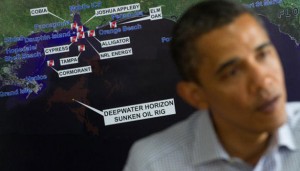Hofmeister has been extraordinarily tenacious in pursuit of this idea, and hopefully this breakthrough signifies serious movement toward action.
After all, it is not as if BP would have trouble finding supertankers to clean up the Gulf.
In all the world, there are 538 VLCC’s, or Very Large Crude Carriers. The English, especially those in the shipping trade, sneer at the term “supertanker” that we Americans have popularized for these massive vessels. “It’s a bad tag,” a wise young tanker broker in London told me this morning. They prefer instead to describe the ship’s line and its DWT, or dead weight tonnage, because those things convey more useful information. Pardon me, but I prefer the term supertanker, because in the Gulf of Mexico we’ve got a super problem. Anyway, VLCC is a little dry.
In any case, as of this morning, of these 538 supertankers dotting the oceans of the world, 47 were basically inert, being used for something the young English broker called “floating storage.” That is, they were full of crude oil, going nowhere. And half of these are full of Iranian heavy crude, which for various reasons no one seems to want. The point of this being that we’ve got a glut of crude on the market at the moment, and it is cheaper to store the oil on 47 of these tankers than sell it. This phenomenon is what is known in the petroleum business as a “contango,” where the delivery price exceeds the market price that you can get for the oil.
Which is all to say that were BP to get supertankers into the Gulf of Mexico to pursue a suck-and-salvage strategy (which The Politics Blog has written about extensively) to get the oil out of the water before the worst of it comes ashore — or before it contaminates the sea floor — it is not as if the company would have a difficult time finding tankers. In fact, it’s not as if it would even have to divert tankers from its own fleet, and remove them from their regular runs picking up and delivering oil.
That’s where tanker brokers come in. The young English broker at EA Gibson shipbroking that I spoke with, as well as the very helpful tanker broker I spoke with from Simpson Spence & Young on Long Island, broke things down. It is a special knowledge they have, and many calculations go into determining what the services of one of these vessels is worth, but chartering a tanker isn’t rocket science. And yes, diverting a tanker from commerce to cleanup will cost BP a premium, but that cost is nothing compared to the ruination of vital coastline and of whole economies. I mean, look at the size of this thing.
Basically, these guys told us that per day, these tankers earn their owners roughly $45,000. If you were to approach one of these brokers looking to charter, on behalf of their owners they would ask a premium, maybe $1,000,000 per day, according to the broker from SSY. Negotiations would bring that down to something more acceptable to both parties, this broker said, and he also indicated that as a premium it wouldn’t be unusual for the ship’s owner to ask for and get ten times what it normally earns on its daily runs.
So for argument’s (and BP’s) sake, let’s say that when BP charters the necessary tankers (and they will have to, eventually), the tanker broker makes them a deal for $450,000 a day. And let’s say that BP orders up six tankers, and for a problem the size of the one they’ve created, these supertankers and their pumping and storage capacity are needed for six months.
At that rate, six supertankers for six months comes to $494,100,000. Round up and call it a half-billion dollars. On the ghost of Lord Browne, we are here to say that that will be the best half-billion BP every spent.
Obviously, these are the roughest of calculations, as today’s rate won’t necessarily be tomorrow’s rate, but you get the idea. And again, a drop in the bucket compared to the bankrupting settlements they’ll otherwise have to pay for destroying whole coastlines, economies, and ways of life.
And, gentlemen, that just accounts for supertankers. There are thousands and thousands of smaller-capacity tankers that are certainly more plentiful and might even save BP a buck. Or if they get more ambitious about cleaning up the Gulf, there are even a handful of ULCC’s, or Ultra-Large Crude Carriers, on earth. At 400,000 metric tons, they’re even bigger than the supertankers.
But what becomes clearer by the day is that this solution, which would be difficult under the best of circumstances, gets harder as the oil in the water migrates and changes in character (thanks to environmental conditions and a million gallons of dispersant).
There is no time for further study or more data. Enough smart people think this idea is feasible and is not technically that challenging to merit trying it immediately.
The other efforts to mitigate the oil — burning, skimming, dispersing — have failed or are failing. Unless someone comes forward with a better idea, now, the only alternative to the tanker solution is to watch the worst of the oil come ashore, and say goodbye to so much.
Read more: http://www.esquire.com/blogs/politics/bp-oil-spill-cleanup-costs-060410#ixzz0qDb0hui6
